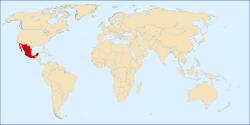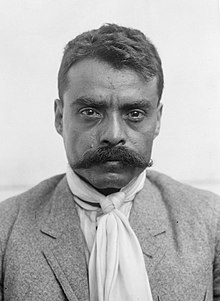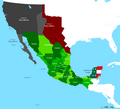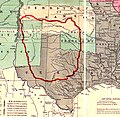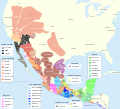Portal:Mexico
|
The Temple of Warriors at Chichen Itza, Mexico
¡Bienvenido! Welcome to the Mexico portal
Mexico, officially the United Mexican States, is a country in the southern portion of North America. It covers 1,972,550 km2 (761,610 sq mi), making it the world's 13th-largest country by area; with a population of almost 130 million, it is the 10th-most-populous country and the most populous Spanish-speaking country. Mexico is organized as a federal constitutional republic comprising 31 states and Mexico City, its capital. It shares land borders with the United States to the north, with Guatemala and Belize to the southeast; as well as maritime borders with the Pacific Ocean to the west, the Caribbean Sea to the southeast, and the Gulf of Mexico to the east.
This is a Featured article, which represents some of the best content on English Wikipedia.
 Baja California is a state in Northwest Mexico that is divided into seven municipalities. According to the 2020 Mexican census, Baja California is the 13th most populous state with 3,769,020 inhabitants and the 12th largest by land area spanning 73,290.08 square kilometres (28,297.46 sq mi). Municipalities in Baja California are administratively autonomous of the state according to the 115th article of the 1917 Constitution of Mexico. Their legal framework derives from Title VI of the state Constitution and the state's 2001 Law of the Municipal Regime. Every three years, citizens elect a municipal president (Spanish: presidente municipal) by a plurality voting system who heads a concurrently elected municipal council (ayuntamiento) responsible for providing public services for their constituents. The municipal council consists of a variable number of trustees and councillors (regidores y síndicos) who govern from the municipal seat. Municipalities are responsible for public services (such as water and sewerage), street lighting, public safety, traffic, and the maintenance of public parks, gardens and cemeteries. They may also assist the state and federal governments in education, emergency fire and medical services, environmental protection and maintenance of monuments and historical landmarks. Since 1984, they have had the power to collect property taxes and user fees, although more funds are obtained from the state and federal governments than from their own income. Municipalities may establish functional and geographical subdivisions called delegaciones and subdelegaciones in accordance with Article 29 of the Law of the Municipal Regime. (Full article...)Selected article - Traditional fixed markets in Mexico are multiple-vendor markets permanently housed in a fixed location. They go by a variety of names such as "mercados públicos" (public markets), "mercados municipales" (municipal markets) or even more often simply "mercados" (markets). These markets are distinct from others in that they are almost always housed in buildings owned and operated by the local government, with numerous stands inside rented by individual merchants, who usually sell, produce and other basic food staples. This market developed in Mexico as a way to regulate pre Hispanic markets called tianguis. These tianguis markets remain in Mexico, with the most traditional held on certain days, put up and taken down the same day, much the way it was done in Mesoamerica. These fixed mercados can be found in any town of any size in Mexico. Often, they are accompanied one or more days per week by tianguis, which set up around the main building. However, the largest, best developed and most numerous fixed markets are in Mexico City, which has over 300, 80 of which are specialty markets dedicated to one or more classes of merchandise, such as gourmet food, plants, cut flowers, candy etc. (Full article...)Selected pictureThis is a Good article, an article that meets a core set of high editorial standards.
Máscara Dorada (born November 3, 1988) is the ring name of a Mexican luchador enmascarado (masked professional wrestler) currently working for All Elite Wrestling (AEW), New Japan Pro-Wrestling (NJPW) and on the independent circuit. He also regularly performs on the weekly shows of Ring of Honor, AEW's sister promotion under the ring name Metalik. He is best known for his time in WWE where he performed under the ring name Gran Metalik, as a member of Lucha House Party. His real name has not been officially documented, a tradition in Mexican lucha libre where masked wrestlers' real names often are not a matter of public record. In Mexico and Japan, he is best known for his decade-long stint in Consejo Mundial de Lucha Libre under the ring name "Máscara Dorada". He made his debut in 2005, originally using the masked persona Plata II. He later used the ring name Metalik, holding the local Occidente Welterweight Championship, but abandoned the championship when he adopted the Máscara Dorada character. The "Máscara Dorada" character was the first instance of a regular-sized luchador being given a character based on a Mini-Estrella as he was introduced after CMLL introduced Mascarita Dorada in 2007. At one time, Dorada was a quadruple CMLL champion, holding the Mexican National Trios Championship, the CMLL World Trios Championship, the CMLL World Super Lightweight Championship, and the CMLL World Welterweight Championship at the same time. He has held the CMLL World Welterweight Championship four times. After a decade of working for CMLL in his native Mexico, Dorada worked full-time for the Japanese promotion New Japan Pro-Wrestling (NJPW) from January 2015 until returning to CMLL a year later in February 2016. (Full article...)Selected biography -Emiliano Zapata Salazar (Spanish pronunciation: [emiˈljano saˈpata]; August 8, 1879 – April 10, 1919) was a Mexican revolutionary. He was a leading figure in the Mexican Revolution of 1910–1920, the main leader of the people's revolution in the Mexican state of Morelos, and the inspiration of the agrarian movement called Zapatismo. Zapata was born in the rural village of Anenecuilco in Morelos, in an era when peasant communities came under increasing repression from the small-landowning class who monopolized land and water resources for sugarcane production with the support of dictator Porfirio Díaz (President from 1877 to 1880 and 1884 to 1911). Zapata early on participated in political movements against Díaz and the landowning hacendados, and when the Revolution broke out in 1910 he became a leader of the peasant revolt in Morelos. Cooperating with a number of other peasant leaders, he formed the Liberation Army of the South, of which he soon became the undisputed leader. Zapata's forces contributed to the fall of Díaz, defeating the Federal Army in the Battle of Cuautla in May 1911, but when the revolutionary leader Francisco I. Madero became president he disavowed the role of the Zapatistas, denouncing them as mere bandits. (Full article...)
In the news
Selected fare or cuisine -
Guacamole (Spanish: [ɡwakaˈmole] ⓘ; informally shortened to guac in the United States since the 1980s) is an avocado-based dip, spread, or salad first developed in Mexico. In addition to its use in modern Mexican cuisine, it has become part of international cuisine as a dip, condiment and salad ingredient. (Full article...)
General imagesThe following are images from various Mexico-related articles on Wikipedia.
CategoriesTopicsRelated portalsWikiProjectYou are invited to participate in WikiProject Mexico, a WikiProject dedicated to developing and improving articles about Mexico. Associated WikimediaMore portals | ||||||||||




